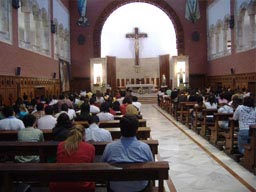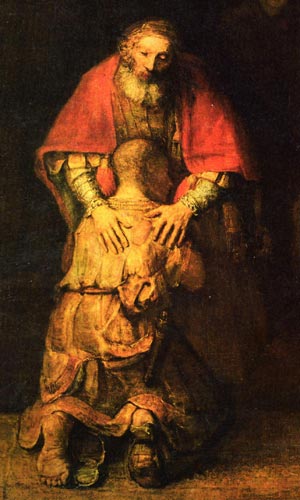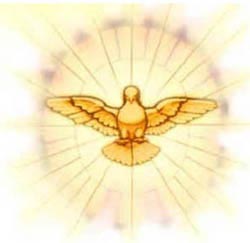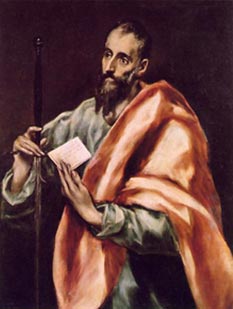We want to help and support the young people at this Catholic university to discover, follow and commit to Jesus Christ and his message. They can then begin their lives anew and, by bringing faith and life together, they can lead the construction of the Civilization of Love.
Priests
Head Chaplain and Director of the Pastoral Service at CEU UCH (Valencia)
Chaplains (Valencia)
Chaplain for the Carmelitas Building (Elche)
- Fr. Santiago Estradera Gómez
Capellán Sede Reyes Católicos (Elche)
- Fr. Miroslaw Karol
CEU UCH Chaplain in Castellón
- Fr. Samuel Torrijo Vicente de Vera
Holy Communion

Times and locations of Holy Communion
| Location | Times | Chaplain |
|---|---|---|
| Chapel in the Rectorate Building (Alfara) |
From Tuesday to Friday at 1.30 pm Monday at 1.30 pm |
Fr. Francisco Javier Sánchez Soto Fr. Luis Sánchez Ruíz |
| Chapel in the Health Sciences Building |
Mondays, Tuesdays, Thursdays and Fridays at 10 am Wednesdays at 10 am |
Fr. Domingo Pacheco Machado Fr. Luis Sánchez Ruíz |
| Chapel in the Carmelitas Building (Elche) | Thursday at 10.30 am | Fr. Santiago Estradera Gómez |
| Chapel in the Reyes Católicos Building (Elche) | Wednesday at 6 pm & Thursday at 10.30 am. | Fr. Mirek Karol |
CHRIST TELLS US THAT HE IS THE BREAD OF LIFE AND THOSE WHO EAT IT WILL HAVE ETERNAL LIFE (JOHN 6, 26-58)
‘The sacrament of charity, the Holy Eucharist is the gift that Jesus Christ makes of himself, thus revealing to us God's infinite love for every man and woman. This wondrous sacrament makes manifest that “greater” love which led him to “lay down his life for his friends” (John 15:13). Jesus did indeed love them “to the end” (John 13:1). In those words the Evangelist introduces Christ's act of immense humility: before dying for us on the Cross, he tied a towel around himself and washed the feet of his disciples. In the same way, Jesus continues, in the sacrament of the Eucharist, to love us “to the end,” even to offering us his body and his blood. What amazement must the Apostles have felt in witnessing what the Lord did and said during that Supper! What wonder must the eucharistic mystery also awaken in our own hearts!
In the sacrament of the altar, the Lord meets us, men and women created in God’s image and likeness (cf. Genesis 1:27), and becomes our companion along the way. In this sacrament, the Lord truly becomes food for us, to satisfy our hunger for truth and freedom. Since only the truth can make us free (cf. John 8:32), Christ becomes for us the food of truth (...) In the sacrament of the Eucharist, Jesus shows us in particular the truth about the love which is the very essence of God. It is this evangelical truth which challenges each of us and our whole being (...)
And because the world is “the field” (Matthew 13:38) in which God plants his children as good seed, the Christian laity, by virtue of their Baptism and Confirmation, and strengthened by the Eucharist, are called to live out the radical newness brought by Christ wherever they find themselves. They should cultivate a desire that the Eucharist have an ever deeper effect on their daily lives, making them convincing witnesses in the workplace and in society at large. I encourage families in particular to draw inspiration and strength from this sacrament. The love between man and woman, openness to life, and the raising of children are privileged spheres in which the Eucharist can reveal its power to transform life and give it its full meaning.’
Apostolic Exhortation “Sacramentum Caritatis” of Pope Benedict XVI
Confession

Confession
In a society in which the line between good and bad is ever more difficult to see due to moral relativism, it can be hard to see why one should apologize or acknowledge a mistake. Hate, resentment and pride can be formidable obstacles in today’s society, in preventing us from uttering the word “sorry”. However, our conscience reminds us that we are not perfect and that we can all make mistakes. These mistakes can often become a burden which weigh on our minds. For this reason, confession can serve to take away this burden and provide us with the peace that we need to live life to the full. The amount of time that has passed since our last confession does not matter, nor do the number and the gravity of our sins – sins being offences against God and others, or rather, failures to comply with God’s Ten Commandments. If we are truly repentant and we have the humility to confess our sins to God through the priest (who God has chosen as the minister of reconciliation), then our sins will be forgiven.
Spiritual support
Everyone, at one time or another, feels the need to speak to someone they trust about the problems and worries we have in our lives. We want another person’s advice and personal perspective, so that we can overcome or resolve a difficult situation that we are faced with. Yet often we can’t find the person who we need or sometimes we may feel that the advice received from family and friends is not enough to deal with a particular situation. In the end, we need someone who understands us, won’t judge us, and won’t be upset about what we say. We need someone who can draw on the Gospel to help us grow and develop as people and reach maturity as a Christian. This is what spiritual support means. As you go through life, remember that you do not have to be alone.
The sacrament of repentance and reconciliation
If many have lost their perspective on good and evil, it is because they have lost their sense of God, interpreting guilt only from a psychological or sociological viewpoint. (John Paul II)
As St John the Apostle said, “If we say we have no sin, we deceive ourselves, and the truth is not in us. If we confess our sins, he is faithful and just and will forgive our sins.”
To acknowledge one's sin, indeed – penetrating still more deeply into the consideration of one's own personhood – to recognize oneself as being a sinner, capable of sin and inclined to commit sin, is the essential first step in returning to God.”
Apostolic exhortation “Reconciliatio et Paenitentia”, John Paul II
Five steps for a good confession
The Church recommends taking five steps to make a good confession and to get the most out of this wonderful sacrament.
- 1. Examine your conscience. We must open ourselves up to God who loves us and wants to help us. We must carefully examine our lives and open up our hearts without deception.
- 2. Show remorse for your sins. We must feel real sorrow for having sinned, as this has hurt the one we love most: God.
- 3. Show a firm desire not to sin again. To really show love, we cannot keep on hurting the object of our love. Confession serves no purpose if there is no desire to change. We can fall again through weakness, but the fall is not important. What is important is that we must strive not to fall.
-
4. Confess your sins to the priest. The priest is an instrument of God. Let us put our shame and pride to one side and open up our souls, safe in the knowledge that it is God who is listening.
- Inside the confessional, you should greet the priest and say: “Bless me, Father, for I have sinned.” In Spain, the priest may greet you with the phrase Ave María Purísima (“Hail Mary Immaculate”) to which the correct reply is Sin pecado concebida (“conceived without sin”).
- Then you should say: “It has been [period of time] since my last confession.” Then, tell the priest your sins, clearly and honestly.
- 5. You will then be absolved of your sins and asked to carry out a penance. This is the most beautiful moment, as we receive God’s forgiveness. A penance is a simple act through which we atone for our sins.
Confirmation

THE COMING OF THE HOLY SPIRIT (ACTS 2, 1-13)
This sacrament strengthens and completes the work begun with Baptism. Through this sacrament, the person who has been baptized is strengthened by receiving the Holy Spirit. It ensures a deeper affiliation with the divine and with the Church, providing the person receiving the sacrament with the strength to bear witness for Jesus Christ in word and in action. He or she is thus able to defend and pass on the faith. Through the sacrament of Confirmation, we become mature Christians and are able to lead a more rounded and active Christian life. It is the sacrament that marks one’s maturity as a Christian and enables us to become witnesses of Christ.
Receiving this sacrament is necessary for the completion of baptismal grace. Indeed, the sacrament of Confirmation binds those who are baptized “more perfectly to the Church and they are enriched with a special strength of the Holy Spirit.” In this way, those receiving the sacrament become true witnesses of Christ “to spread and defend the faith by word and deed.”
Confirmation is a conscious and freely undertaken acceptance of the salvation that God offers us through Christ. But this acceptance must be both personal and public, before the Church community, to confirm the acceptance given on our behalf by our parents and godparents when we were baptized.
Information on preparation for confirmation:
Fr. José Francisco Castelló Colomer
Patron saints of study programmes

FACULTY OF THE HUMANITIES AND COMMUNICATION SCIENCES
| STUDY PROGRAMME | PATRON SAINT/a | SAINT'S DAY |
|---|---|---|
| Audiovisual Communication | St Clare | 11th August |
| Journalism | St Francis de Sales | 24th January. |
| Advertising and Public Relations | St Paul (Feast of the Conversion of St Paul) | 25th January |
| Primary Education | St Joseph Calasanz | 27th November |
FACULTY OF LAW, BUSINESS AND POLITICAL SCIENCE
| STUDY PROGRAMME | PATRON SAINT/a | SAINT’S DAY |
|---|---|---|
| Political Science | St Thomas More | 22nd June |
| Law | St Raymond of Penyafort | 7th January |
| Business Management | St Vincent Ferrer | First Monday after Easter |
FACULTY OF HEALTH SCIENCES
| STUDY PROGRAMME | PATRON SAINT/a | SAINT’S DAY |
|---|---|---|
| Pharmacy | The Immaculate Conception | 8th December |
| Dentistry | St Apollonia | 9th February |
| Nursing | St John of God | 8th March |
| Physiotherapy | St Lazarus | 17th December |
| Nutrition | St Martha | 29th July |
| Optics and Optometry | St Otilia | 13th December |
| Medicine | St Luke | 18th October |
| Physical Education and Sports Science | St Paul | 25th February |
FACULTY OF VETERINARY MEDICINE
| STUDY PROGRAMME | PATRON SAINT | SAINT’S DAY |
|---|---|---|
| Veterinary Medicine | St Francis of Assisi | 4th October |
ESET
| STUDY PROGRAMME | PATRON SAINT/a | SAINT’S DAY |
|---|---|---|
| Architecture | St Thomas the Apostle | 3rd July |
| Computer Engineering | Blessed Ramon Llull | 27th November |
| Industrial Design | St Benedict Biscop | 12th January |
OTHER FACULTIES
| STUDY PROGRAMME | PATRON SAINT/a | SAINT’S DAY |
|---|---|---|
| Gastronomy | St Paschal Baylon | 17th May |










